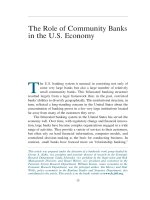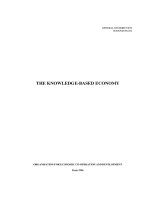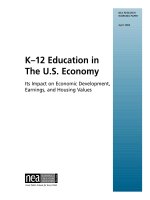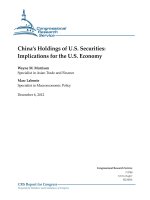the USA mixed economy
Bạn đang xem bản rút gọn của tài liệu. Xem và tải ngay bản đầy đủ của tài liệu tại đây (27.47 KB, 3 trang )
A Mixed Economy: The Role of the Market
The United States is said to have a mixed economy because privately
owned businesses and government both play important roles. Indeed,
some of the most enduring debates of American economic history focus
on the relative roles of the public and private sectors.
The American free enterprise system emphasizes private ownership.
Private businesses produce most goods and services, and almost twothirds of the nation's total economic output goes to individuals for
personal use (the remaining one-third is bought by government and
business). The consumer role is so great, in fact, that the nation is
sometimes characterized as having a "consumer economy."
This emphasis on private ownership arises, in part, from American
beliefs about personal freedom. From the time the nation was created,
Americans have feared excessive government power, and they have
sought to limit government's authority over individuals -- including its role
in the economic realm. In addition, Americans generally believe that an
economy characterized by private ownership is likely to operate more
efficiently than one with substantial government ownership.
Why? When economic forces are unfettered, Americans believe,
supply and demand determine the prices of goods and services. Prices,
in turn, tell businesses what to produce; if people want more of a
particular good than the economy is producing, the price of the good
rises. That catches the attention of new or other companies that, sensing
an opportunity to earn profits, start producing more of that good. On the
other hand, if people want less of the good, prices fall and less
competitive producers either go out of business or start producing
different goods. Such a system is called a market economy. A socialist
economy, in contrast, is characterized by more government ownership
and central planning. Most Americans are convinced that socialist
economies are inherently less efficient because government, which
relies on tax revenues, is far less likely than private businesses to heed
price signals or to feel the discipline imposed by market forces.
There are limits to free enterprise, however. Americans have always
believed that some services are better performed by public rather than
private enterprise. For instance, in the United States, government is
primarily responsible for the administration of justice, education
(although there are many private schools and training centers), the road
system, social statistical reporting, and national defense. In addition,
government often is asked to intervene in the economy to correct
situations in which the price system does not work. It regulates "natural
monopolies," for example, and it uses antitrust laws to control or break
up other business combinations that become so powerful that they can
surmount market forces. Government also addresses issues beyond the
reach of market forces. It provides welfare and unemployment benefits
to people who cannot support themselves, either because they
encounter problems in their personal lives or lose their jobs as a result of
economic upheaval; it pays much of the cost of medical care for the
aged and those who live in poverty; it regulates private industry to limit
air and water pollution; it provides low-cost loans to people who suffer
losses as a result of natural disasters; and it has played the leading role
in the exploration of space, which is too expensive for any private
enterprise to handle.
In this mixed economy, individuals can help guide the economy not
only through the choices they make as consumers but through the votes
they cast for officials who shape economic policy. In recent years,
consumers have voiced concerns about product safety, environmental
threats posed by certain industrial practices, and potential health risks
citizens may face; government has responded by creating agencies to
protect consumer interests and promote the general public welfare.
The U.S. economy has changed in other ways as well. The
population and the labor force have shifted dramatically away from farms
to cities, from fields to factories, and, above all, to service industries. In
today's economy, the providers of personal and public services far
outnumber producers of agricultural and manufactured goods. As the
economy has grown more complex, statistics also reveal over the last
century a sharp long-term trend away from self-employment toward
working for others.
Restrict from:
/>my.htm









